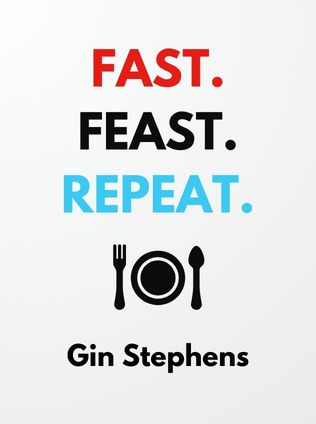
Fast. Feast. Repeat.
The Comprehensive Guide to Delay, Don't Deny® Intermittent Fasting--Including the 28-Day FAST Start
By Gin Stephens
Published 03/2021
About the Author
Gin Stephens is not just a writer but a beacon of transformation for many seeking a healthier lifestyle. Once a teacher, Stephens embarked on a personal journey to health that led her to lose over 80 pounds through intermittent fasting. Her success wasn’t just physical; it inspired her to research and share the wisdom she uncovered. Her first book, “Delay, Don’t Deny,” became a bestseller, and she has since built a supportive online community where people learn and grow together on their weight-loss journeys. Stephens’ experience and dedication make her an authoritative voice in the world of intermittent fasting, guiding readers with a blend of scientific insights and personal anecdotes.
Main Idea
At the heart of “Fast. Feast. Repeat.” is the concept of intermittent fasting (IF) as a sustainable lifestyle rather than a fleeting diet. Stephens presents IF not only as a method for weight loss but as a pathway to overall well-being. She challenges the conventional dieting mentality, arguing that IF allows for a more intuitive and guilt-free relationship with food. By cycling between periods of fasting and feasting, individuals can harness the body’s natural fat-burning mechanisms, improve their health, and achieve lasting results without the restrictive nature of traditional diets.
Table of Contents
- Introduction to Intermittent Fasting
- Why Fasting is Better Than Dieting
- How to Get Started with Intermittent Fasting
- The Science Behind Fasting
- Common Challenges and How to Overcome Them
- Maintaining Your Progress and Long-term Benefits
Introduction to Intermittent Fasting
Intermittent fasting is more than a trend; it’s a return to a natural way of eating that aligns with how humans have evolved. In “Fast. Feast. Repeat.”, Stephens demystifies IF, emphasizing that it’s not about what you eat but when you eat. This approach distinguishes IF from diets that impose restrictive eating patterns. Instead of constant calorie counting, intermittent fasting focuses on periods of fasting (where no calories are consumed) followed by periods of feasting. This cyclical pattern allows the body to switch between storing energy and burning fat efficiently.
As Stephens explains, "Intermittent fasting isn’t a diet. It’s a lifestyle. It’s a way of eating that fits into your life without the burdens of conventional dieting" (Stephens). This perspective is key to understanding the flexible nature of IF and how it can be tailored to individual lifestyles and goals.
Why Fasting is Better Than Dieting
One of the most compelling arguments Stephens makes is that fasting is superior to traditional dieting. Diets often fail because they don’t address the underlying issues of insulin resistance and metabolic adaptation. When we eat, our body releases insulin to manage blood glucose levels, storing excess energy as glycogen in the liver and muscles. However, when glycogen stores are full, the body converts the remaining glucose into fat. This cycle, perpetuated by frequent eating, leads to weight gain and hinders fat loss.
Stephens likens this to having a “glycogen wallet” and a “fat bank.” The wallet is easy to access but has limited capacity, while the bank holds much more energy but is harder to tap into. Fasting allows the body to empty the wallet and start withdrawing from the bank, leading to fat loss. As she explains, "Dieting fails because it doesn’t give your body a chance to burn fat effectively. Fasting, on the other hand, teaches your body to become a fat-burning machine" (Stephens).
Sign up for FREE and get access to 1,400+ books summaries.
You May Also Like
The Subtle Art of Not Giving a F*ck
A Counterintuitive Approach to Living a Good Life
By Mark MansonRich Dad Poor Dad
What the Rich Teach Their Kids About Money - That the Poor and Middle Class Do Not!
By Robert T. KiyosakiHow To Win Friends and Influence People
The All-Time Classic Manual Of People Skills
By Dale Carnegie



















